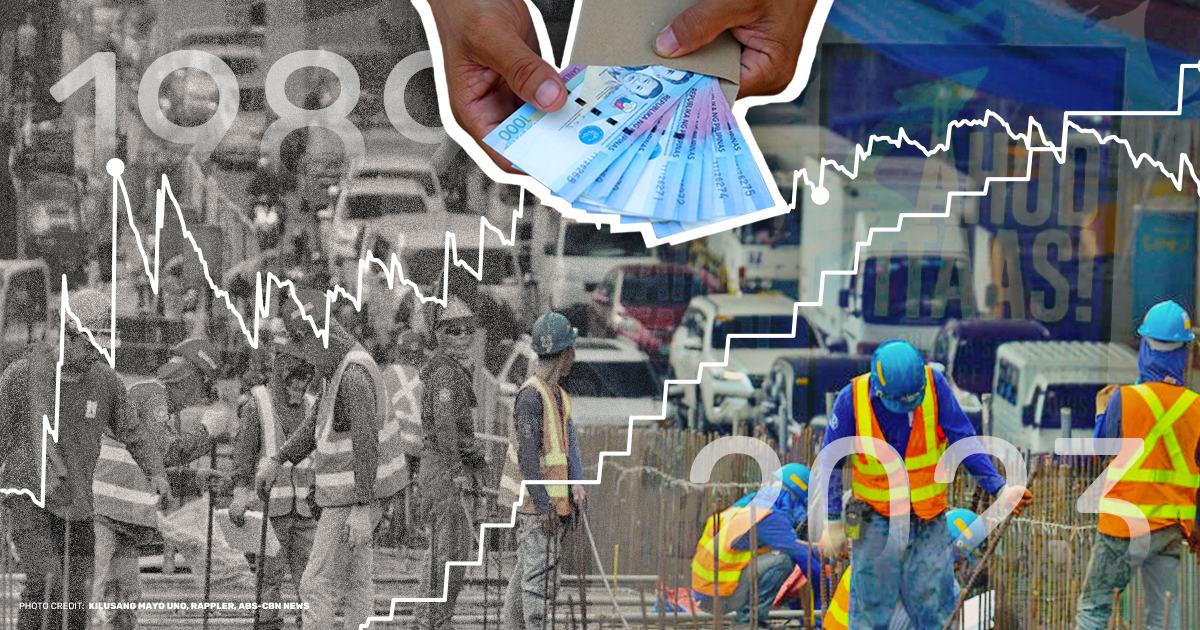Research group IBON said that adjusted for inflation, minimum wages in all 17 regions across the country are worth less today than after the last legislated nationwide wage hike in July 1989–nearly 34 years ago. Regional minimum wages have not kept up with rising prices of goods and services, and the real value of the minimum wage has fallen 28% on average across all regions nationwide. This strengthens the argument for reverting to a nationally mandated wage hike, said the group.
According to IBON computations, the average wage gap is Php164 but an across-the-board (ATB) hike of this size today will still not be enough and the real value of the minimum wage in nine (9) regions is still going to be lower than in 1989.
The Philippines basically had a national minimum wage until June 1989. The only distinction in the national minimum wage was between agricultural and non-agricultural wages and, to a minor degree, between Metro Manila and outside Metro Manila (for non-agriculture) and between plantation and non-plantation (for agriculture). Republic Act (RA) No. 6727 or the Wage Rationalization Act of 1989 declared that wages would henceforth be set on a regional basis by regional wage boards.
IBON recalled that in July 1989, RA 6727 legislated a Php25 wage hike which was around a 39.1% increase and resulted in the non-agriculture basic wage reaching Php89 in all 17 regions. Since regionalization, minimum wage increases have varied widely between regions in terms of frequency but especially in magnitude. (See Table 1)
The highest minimum wage in each region increased from a uniform Php89 in July 1989 to range from Php341 (BARMM) to Php570 (NCR) as of April 2023. Nominal wages increased on average by almost five-fold (360%) but the general price level, measured by the consumer price index (CPI), increased on average by over six-fold (544%).
This resulted in the real value of the basic wage falling by an average of 28% across all regions. The biggest decline was in BARMM which saw a huge 52% fall, while the smallest decrease was the 3.3% fall in real value in NCR.
The wide variation in eroded real wages means that the respective amounts needed per region to even just recover to their levels in July 1989 also vary widely, IBON explained. (See Table 2) The smallest amount needed is in NCR where a Php20 wage hike will be enough to return the real wage there to its level in July 1989 (although not to its highest level reached in December 2018 which requires a Php57 wage hike). The largest amount needed is in BARMM where the Php370 required is even more than the Php341 prevailing today.
The average of all the 17 regional wage hikes needed is Php164, IBON said, but applying this amount across-the-board today would still leave nine (9) out of 17 regions with real wages below their levels in July 1989. The regions where a Php164 wage hike is not enough are Regions IV-B, V, VII, VIII, IX, X, XII, XIII, and BARMM. Most of these are among the regions with the highest inflation and the stingiest wage hikes of the last 34 years, the group noted.
IBON said that the regional wage trends since RA 6727 confirm how the regional wage boards have failed to even just make sure that the minimum wage keeps up with inflation. These have even been used to repress wages especially outside of NCR. The group said that this is beneficial most of all for employers and their profits while extremely adverse for workers and their families.
Inflation in most regions has also stayed within a reasonably narrow band with only two or three regional outliers, IBON added. Taken altogether, the argument for reverting to a nationally mandated wage system is strong when looked at from the perspective of workers’ welfare rather than corporate profits.
Workers can also be further encouraged to support a legislated wage hike by the very positive experience in 1989 where the legislated Php25 or 39.1% increase then would be equivalent to about a Php161 wage hike today, said IBON.###



